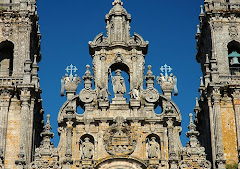After Jesus, St Paul is most probably the most important person in the history of western Christianity. Jesus' message was preached exclusively to the Jews of Judea and Jerusalem. He seemed to view himself as a messenger who was sent to change the Jewish religion as practiced in the Temple in Jerusalem.But Paul took this message to both the Jewish diaspora (those living outside Holy Land of Israel) and also to the pagans, or Gentiles, worshippers of the traditional gods of the Greeks or Roman Empire, or of other cults. In the process he changed the religion of Christianity, partly by adding many instructions about forms of worship, partly by changing the message.Although there were other preachers who took the message to other parts of the Roman Empire (St Thomas, St Andrew etc.) much less is known of them. It's almost certain that if St Paul had not preached, Christianity would have died out when the Jewish rebellion of 66 AD was crushed and Jerusalem burned. At the time Paul preached, the life of Jesus had not been condensed into the present-day Bible; even the four 'gospels' or short biographies, which form the main part of the Bible, weren't finalized until after 100 AD. So Paul had no standard text; he also had never met Jesus personally. Thus he was able to interpret quite freely.Paul's beliefs are known from letters he wrote to the peoples that he had visited. Many of the letters are included in the Bible. These letters instruct people in the new religion; they were intended to be read to the new Christians in their new, often secret, churches. They define the place of women, sin and the church officials.
An engraving of Antioch of Psidia, 1860 *Paul travelled for about 20 years. During that time he visited and re-visited many places in Asia Minor. He travelled by foot and by ship. Periodically he met with church elders in Antioch or Jerusalem, where they are known to have argued over doctrine (for example, the church elders thought that all Christians should be circumcised). In many ways, Paul prevailed.Paul was a Jew, of the tribe of Benjamin, but born into the diaspora (his native town was Tarsus, in SE Turkey). He was also a citizen of the Roman Empire, an honour at that time reserved for families who had served the state, and which entitled him to trial in Roman courts. Finally, he was a product of the Greek-speaking Hellenistic tradition, and probably education, which was shared by everyone living around the Eastern Mediterranean. It was because of this universal state and culture that travel was so comparatively easy. In this universal culture, the adapted Christianity spread easily.Paul was both a product of his time and a major influence on our time. This route is a glimpse of the land he travelled through on his first journey through Asia. One day we hope to extend it to some of the other places he visited.
Travels of St Paul Travels of St PaulThey are: Jerusalem, Damascus, Caesarea, Cilicia, Antioch, (as a young man).1st Journey: Antioch, Seleucia, Cyprus (Salamis and Paphos), Perge, Antioch in Pisidia, Konya (Iconium), Derbe, Lystra, Antalya, Antioch.2nd Journey: Cilicia, Derbe, Lystra, Phrygia, Galatia, Mysia (Alexandra Troas), Samothrace, Macedonia (Neapolis, Philippi, Amphipolis, Apollonia, Thessalonica, Beroea), Athens, Corinth, Cenchreae, Ephesus, Syria, Caesarea, Jerusalem, Antioch.3rd Journey: Galatia, Phrygia, Ephesus, Macedonia, Corinth, Cenchreae, Macedonia, Troas, Assos, Mytilene, Chios, Samos, Miletus, Cos, Rhodes, Patara, Tyre, Ptolomais, Caesarea, Jerusalem.
dimanche 21 juin 2009
Inscription à :
Publier les commentaires (Atom)











Aucun commentaire:
Enregistrer un commentaire